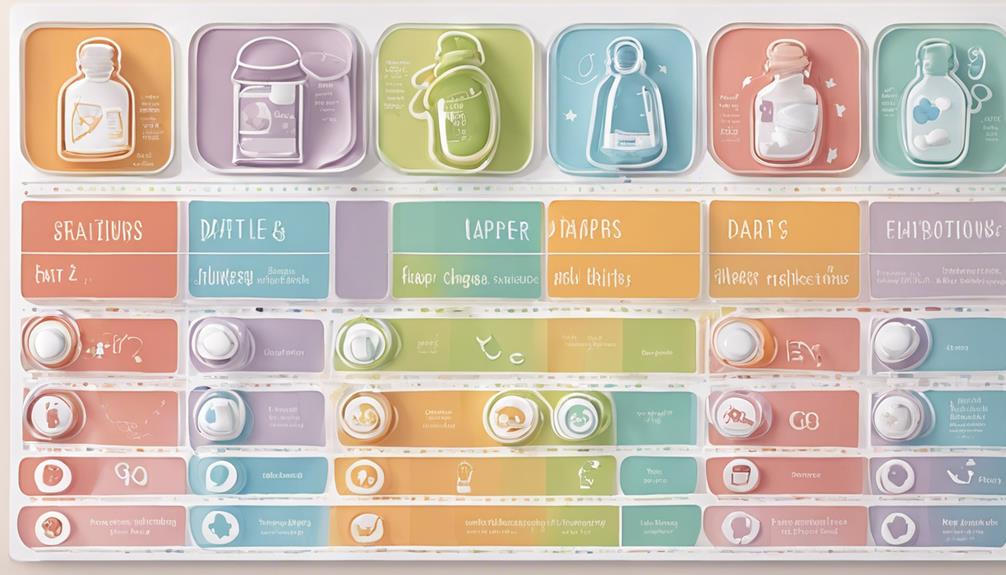As we embark on the path of developing a nursing care plan for newborns, we navigate through essential considerations.
Each step in this process holds the key to providing best care and fostering healthy development in our tiniest patients.
Through a meticulous approach that encompasses assessment, diagnosis, goal-setting, intervention, and evaluation, we pave the way for a complete care plan tailored to meet the unique needs of each newborn.
This systematic guide not only equips us with the tools to address immediate concerns but also sets the foundation for long-term well-being and thriving.
Key Takeaways
- Assess vital signs and use APGAR scoring for newborn evaluation.
- Identify and address potential nursing diagnoses for newborn health.
- Set tailored care goals focusing on growth, development, and well-being.
- Implement interventions to mitigate health risks and promote newborn health.
Initial Assessment and Vital Signs
Have we guaranteed the thorough assessment of essential signs, including temperature, pulse, respiration, and blood pressure, to kickstart the care plan for our precious newborns? Monitoring these crucial signs is paramount in making sure the well-being of our newest arrivals.
By adhering to normal ranges such as a temperature of 97.7-99.4 Fahrenheit, a pulse of 120-160 bpm, respirations of 30-60 breaths/min, and a blood pressure of 75-50/45-30 mm Hg, we can swiftly detect any abnormalities. Early detection of issues through vigilant assessment allows for timely interventions that can be critical in newborn health.
The use of APGAR scoring at the 1st and 5th minutes of life provides a valuable tool in predicting neonatal mortality, with scores between 7-10 being considered normal. Categories like Activity, Pulse, Grimace, Appearance, and Respiration help us pinpoint areas needing attention, with scores below 3 indicating concerning health status.
Our dedication to meticulous assessment and vigilance in monitoring ensures the best possible start for these little ones.
Developing Nursing Diagnoses

In developing nursing diagnoses for newborns, our focus is on identifying potential health issues and risks in the neonatal period. By recognizing concerns such as impaired gas exchange, infection control, and maintaining oxygen saturation within best levels, we can tailor effective care plans to support the well-being of each newborn. These nursing diagnoses serve as a roadmap for providing individualized and thorough care, ensuring that we address specific needs and promote positive health outcomes.
Through thorough assessment and consideration of common issues like risks for hypothermia and unstable blood glucose levels, we can develop targeted strategies to deliver high-quality care to newborns. Nursing diagnoses play an important role in guiding healthcare professionals towards interventions that prioritize the newborn's health and safety, ultimately contributing to the overall success of newborn care plans.
Formulating Care Goals
Formulating care goals for newborns involves tailoring specific objectives to optimize their growth, development, and overall well-being. In nursing, care goals for newborns often center around promoting breastfeeding to guarantee proper nutrition and bonding between the infant and mother.
Monitoring weight gain is critical as it serves as an indicator of the newborn's health and development progress. Hydration is another essential aspect of care goals, making sure that the newborn remains adequately hydrated for overall well-being.
These care goals must be individualized, taking into account each newborn's unique needs and health status. Regular evaluation and adjustment of these goals are essential to track progress effectively and make any necessary modifications to ensure ideal outcomes.
Implementing Nursing Interventions

Tailoring specific nursing interventions for newborns involves addressing health risks such as hypothermia, impaired gas exchange, infection, and unstable blood glucose levels through careful assessments and targeted care plans. When implementing nursing interventions for newborns, we focus on the following key aspects:
- Maintaining Body Temperature: Ensuring the newborn is kept warm through appropriate clothing and environmental temperature control.
- Supporting Respiratory Function: Monitoring breathing patterns and providing interventions to support best oxygenation.
- Preventing Infections: Implementing strict hygiene practices and aseptic techniques to minimize the risk of infections.
- Ensuring Stable Blood Glucose Levels: Regularly monitoring blood glucose levels and providing interventions such as timely feedings to maintain stability.
Nurses play a crucial role in promoting personalized care through practices like skin-to-skin contact and breastfeeding support. By tailoring interventions to meet the individual needs of each newborn and utilizing evidence-based strategies, we aim to improve health outcomes and foster a nurturing environment for the newborn's development.
Evaluating and Adjusting Care Plan
Upon evaluating the effectiveness of the newborn care plan through continuous monitoring and assessment, adjustments are made based on the infant's response to interventions and evolving health status. It's essential to assess the newborn's vital signs, weight measurements, and other objective data to track progress accurately.
By collaborating with healthcare providers and the newborn's family, we guarantee that the care plan aligns with the infant's needs. Ongoing evaluation and adjustment of the care plan are vital to address any emerging health issues and guarantee ideal outcomes for the newborn.
Through this continuous process, we can tailor interventions to meet the specific requirements of the newborn, promoting their health and well-being. By remaining vigilant and responsive to changes in the infant's condition, we can provide individualized care that supports their development and overall healthcare journey.
Frequently Asked Questions
What Are the 5 Steps of the Nursing Care Plan?
We identify five essential steps in a nursing care plan: assessment, diagnosis, planning, implementation, and evaluation. These steps help us gather data, pinpoint needs, set goals, carry out interventions, and assess outcomes for newborns effectively.
How to Do a Care Plan Step by Step?
We assess the newborn's health, create nursing diagnoses, prioritize care, set goals, and implement evidence-based interventions. It's a detailed process that guarantees the newborn's needs are met thoroughly and effectively.
How to Write a Nursing Care Plan Using the Nursing Process?
We assess the newborn's health, diagnose issues, plan achievable goals, implement care, and evaluate outcomes. We prioritize newborn needs, document interventions, and adjust for best health. Our focus is compassionate, detail-oriented nursing care.
What Are the Nanda Nursing Diagnosis List for Newborns?
We prioritize newborn well-being by utilizing the NANDA nursing diagnosis list. It outlines potential health risks like Hypothermia, Impaired Gas Exchange, and Infection, guiding us in creating tailored care plans to address specific needs effectively.
Conclusion
As we wrap up our journey in creating a nursing care plan for newborns, let's envision a flourishing garden of care, where each bloom represents a step taken to nurture and protect these precious little ones.
With our personalized approach and evidence-based interventions, we've sown the seeds of health and well-being, ensuring that each newborn receives the tailored support they need to thrive.
Together, we'll continue to tend to this garden, watching it blossom with every passing day.









